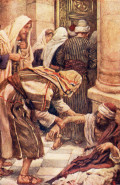The Problem Part 2 of 2
by John Lowe
(Laurens SC, USA)

The Jews of Palestine would pride themselves on the fact that they dwelt in the land of the patriarchs and the land of promise; that they used the language which their fathers spoke, and in which the prophecies of God were given; and that they were constantly near the temple, and regularly engaged in its ceremonies and rituals. On the other hand, the Jews from other parts of the world would be suspicious, jealous, and envious of their brethren, and would be likely to charge them with partiality, or of taking advantage in their contact with them. These occasions of strife would not be destroyed by their conversion to Christianity.
“The Hebrews” were those Jews born in Palestine, and were the inhabitants of that country, and chiefly of Jerusalem, who used their native tongue (Hebrew, or rather the Syriac language), and were inclined to look down on the "Grecians" as an inferior class; some of this spirit was present in the Jerusalem church.
“Because their widows were neglected in the daily ministration.” The cause of the murmuring mentioned in the above clause seems to have been this: When all the disciples had put their property into a common treasury, it was intended that out of it each should have his needs met. The foreign or Hellenistic Jews began to be jealous, and they complained that their widows were neglected in the daily distribution of food, that they received less than what was given to the Hebrew widows; the reason being that the Palestine Jews were partial to those of their own country. The Hebrew widows might be related to many in the community, therefore they were more highly regarded and better supplied every day, than the Hellenistic widows were, whose husbands had dwelt in foreign lands, and were not so well known, and had fewer acquaintances and relatives. It seems the ministration or distribution was made every day: and such a practice was common among the Jews, who used to collect every day for the poor, and give it daily to them. This affair shows that the concept of relying upon community property could never have been designed to become general. Indeed, it was no ordinance of God; and, in any state of society, it must eventually become impracticable (The failure of Communist society in the Twentieth Century bears this out.). The apostles, hearing of this murmuring, came to the resolution which will be discussed in the next lesson.
“Were neglected” has the idea of being "overlooked" by those whom the apostles employed, and who were probably from the Hebrew class, which was the most numerous. The complaint was in all likelihood well founded, though we cannot suspect the distributors of intentional partiality. It was really just a matter of communicating love, each party wishing to have their own poor taken care of in the best manner.
“The daily ministration” was the daily distribution of alms according to need, and/or of food, probably the latter. This was carried out at first by the apostles (Acts 4.355) and later by collectors appointed by the apostles, who receive "every day", a piece of bread, or any sort of food, or fruit, or money, from whoever freely offers it; and they distribute that which is collected, "in the evening", among the needy. It is clear from the Epistles that "widows" were objects of special attention in the primitive church, and that the first Christians regarded it as a matter of indispensable commitment to provide for their needs (1 Timothy 5:3, 1 Timothy 5:9-10, 1 Timothy 5:16; James 1:276).
________________________________________
1 And in those days Peter stood up in the midst of the disciples, and said, (the number of names together were about an hundred and twenty,)
2 Then they that gladly received his word were baptized: and the same day there were added unto them about three thousand souls.
3 And believers were the more added to the Lord, multitudes both of men and women.)
4 Now when Paul and his company loosed from Paphos, they came to Perga in Pamphylia: and John departing from them returned to Jerusalem. But when they departed from Perga, they came to Antioch in Pisidia, and went into the synagogue on the sabbath day, and sat down. And after the reading of the law and the prophets, the rulers of the synagogue sent unto them, saying, Ye men and brethren, if ye have any word of exhortation for the people, say on. Then Paul stood up, and beckoning with his hand said, Men of Israel, and ye that fear God, give audience.
5 And laid them down at the apostles' feet: and distribution was made unto every man according as he had need.
6 Pure and genuine religion in the sight of God the Father means caring for orphans and widows in their distress and refusing to let the world corrupt you.
No content on preachology.com may be printed or
copied to any other site without permission.
|
The Preaching Ezine Subscribe to my free newsletter for monthly sermons and get a free book right now. Just follow the link above and get the details! |
|
Sermon Supply Ministry
Be ready for Sunday…before Saturday night! |
|
Manna Seminary
Did you ever want to start or finish your Ministry Training? |
|
YOUR PAGES: by sharing YOUR great sermons! by sharing YOUR great poems! |



